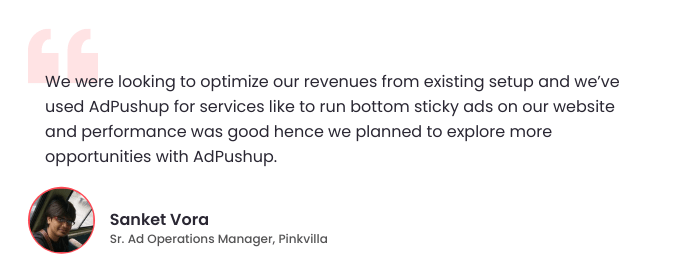How do cookie demise and CCPA affect publishers? What ad tech changes should you expect in coming years? We asked Ben from VentureBeat.
The slow death of third-party cookies makes your first-party data more valuable.
We recently reached out to Ben Ilfeld, Head of Product at VentureBeat, the leading source for transformative tech news and events, which provides deep context to help business leaders make smart decisions and stay on top of industry developments.
Ben, who started publishing in his 20’s, is an ad tech entrepreneur and a revenue strategist. For over a decade, Ben has consistently innovated and experimented with new models for creating healthy media ecosystems. Most recently, as Lead Revenue Strategist at 10up, and audience development for dozens of 10up clients.
In 2012, he founded and led product development at SXSW Accelerator Finalist AdGlue, which provided top publishers incremental ad revenue and deeper partnerships with their most valued clients.
In 2008, Ben launched The Sacramento Press as a new breed of the local publication dedicated to rethinking how media interacts with a local audience. Ben built the first independent online local ad network (SLOAN) that generated hundreds of thousands of dollars for over 60 publishers. He was also a founding board member of the Local Independent Online News Publishers (LION).
In our conversation, we talked about the recent changes happening in ad technology and what experts like him think would be the impact on the industry.
Q. Third-party cookies are at the end of their lifecycle. What possible challenges does this bring and what do you suggest to tackle them?
This particular disruption isn’t a shift in the fundamental value publishers provide, but rather the strategies and practices that enable us to unlock and transact on that value.
A key immediate shift is that the slow death of third party cookies makes your first party data more valuable. So, the challenge in 2020 is to continue building transactional relationships (not limited to monetary transactions) with your core audience.
Realistically, many publishers have been slow shifting strategies and adjusting tactics. So, for many there will be a gap with relatively lower revenue prospects. But as stakeholders become more familiar with new opportunities, publishers with strong audiences will rebound.
Q. Any advice to publishers struggling to comply with CCPA?
Honestly, publishers won’t have clarity on the CCPA for some time, but what we learned with GDPR is that taking proactive measures to ensure your audience’s privacy builds trust.
Like with third-party cookies and ad blocking, this is about maintaining and enhancing relationships with your core audiences.
There are some technologies, like Customer Data Platforms, that enable publishers to better adapt their experiences to individual audience member preferences–including privacy. These platforms also build up trusted first-party data and give us greater cross-channel opportunities to build those most valuable transactional relationships.
Again, in the short run, we’re going to hit some bumps. This whole strategic direction is foreign to many publishers. But at VentureBeat, we’re embracing this shift as it aligns us with our core audiences.
Q. What are your thoughts on ad blocking?
Publishers should aim to be both better aligned with our audience’s interests and more creative finding value exchanges with those audiences.
At VentureBeat, we’re building a spectrum of engaging experiences for key audiences. For example, we produce industry-leading events (Transform; GamesBeat Summit); and we provide private forums for thought leaders.
It would be a remarkable mistake to degrade the user experience for a portion of our key audiences who value their attention and privacy. That stance would undermine opportunities to engage and exchange value.

Q. What is your biggest learning in the year 2019 as web publisher, ad tech entrepreneur, and revenue strategist?
2019 proved that the friction of building transactional relationships with audiences is now low enough to support new reader revenue models from digital-only startups. That’s a massive change from the digital media ecosystem of a decade ago.
There’s an opportunity for our audiences to be more involved and invested. And these proof points give scaled publishers some space to experiment themselves.
Q. What are your predictions for the ad industry and technology in 2020?
2020 is set to be a year of transition and experimentation. Buyers, marketplaces, and publishers aren’t ready to take our new experiments to full scale, while the old transactions are being undermined by the exposure we all have to unreliable 3rd party data.
But the shifts we’re grappling with in 2020 are not existential threats to our fundamentals. In fact, I’d argue we will be stronger after this set of strategic adjustments. We will establish closer alignment with our audiences, and provide more reliable and robust data to our partners.
About VentureBeat
VentureBeat is a leading source of news covering everything from AI to gaming, SMBs to enterprise, AR/VR to 5G tech, and more to help business leaders stay up to date with the latest trends. The company is based in SF, California, United States.
- Monthly page views: 12M+
- Alexa global rank: 6812
- Time on site: ~11 minutes
5 Questions With is an interview series in which we ask industry leaders on both the buy- and sell-side about the ongoing issues in the ad tech industry.
FAQs
Third-party cookies are placed on websites by someone other than the owner (a third party) and collect user data for them. In the same way as standard cookies, third-party cookies allow a site to remember something about the user.
Third-party cookies follow you around the web, but they don’t affect your experience. It is for this reason that you should always block third-party cookies if you have the option. In addition to tracking your behavior, third-party cookies serve more relevant ads.
Among the main differences between first and third-party cookies are: Setting the cookie: A first-party cookie is set by the website’s web server or JavaScript. Third-party cookies can be set by a third-party server, such as an AdTech vendor, or by publisher code.

Shubham is a digital marketer with rich experience working in the advertisement technology industry. He has vast experience in the programmatic industry, driving business strategy and scaling functions including but not limited to growth and marketing, Operations, process optimization, and Sales.







